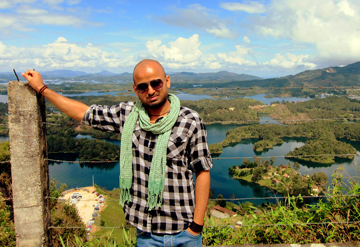Rafat Ali is one of those rare people in the media industry who understands the power he wields with his written words, yet can be so humble and friendly in person. I was struck by that quality in him when we first met probably 10+ years ago when he was first starting the paidContent blog as a one-man operation focused on digital media.
What he accomplished with that site was a lesson for all of us who are running small media ventures, taking a one-man operation and expanding it into a full-fledged online business. Ali received venture funding, expanded staff and built more sites, and eventually sold the site to the Guardian (which later sold it to GigaOm).

After selling his baby, Ali decided to take time off to travel the world and disconnect from the intense 24-hour news cycle that consumes everyone who lives on Internet time for breaking news. And now that he has resurfaced, his new baby is Skift.com, billed as a “travel intelligence media company.”
As he has described the startup on various Mediatwits podcasts (we co-host the show together for MediaShift), Skift will put a laser-sharp focus on the business of travel, the travel business and business travelers, disrupting the current incumbents who cover the industry in a less intense fashion.
We recently connected by email, and he answered my six burning questions about Skift and his plans for the site.
6 Questions for Rafat Ali
1. Why did you decide to target the travel business with Skift? From all your trips abroad?
Rafat Ali: It is in the travel sector, but not really built upon my own travels over the last two years. The cliche is: A startup guy sells his company, goes off to travel the world, and through his experiences during his travel, hits a brainwave in the middle of Mongolia on how to solve all the travel woes in the world. Thankfully, mine isn’t that.
My travels inform my worldview on how we want to build Skift, how broadly we look at travel, but the genesis of Skift is more prosaic: We saw a big white space in the travel information industry, and we’re attacking it.
2. What lessons did you learn from paidContent, and how did you apply them to Skift?
For one, we’re bringing the same energy of the saturation coverage of the digital media industry that we did for years at paidContent, and now bringing it to the world’s largest sector: travel. We’ll be a digital native, 24/7, breaking news, analysis, opinion, somewhat similar to what we did with paidContent.
Also pC, back when it started in 2002, brought together then disparate silos of the larger media-information-entertainment industries, and with Skift, we’re attempting the same with the very large silos of aviation, hospitality, destinations, cruises, technology and others, and bringing them together. The underlying assumption, that these silos will collapse, is the same as paidContent. We’ll see if they’re borne out.
3. Who are your first investors, and how did you find them?
A long list of 17 angels, 14 disclosed: Chris Ahearn, Luke Beatty, Gordon Crovitz,
Craig Forman, Jim Friedlich, Tom Glocer, Vishal Gondal, Jason Hirschhorn, Peter Horan, Alan Meckler, Mohamed Nanabhay, Sanjay Parthasarathy, Amol Sarva, Chris Schroeder.
These are all very accomplished business execs in the media-tech industry that I’ve known for years, covered them at paidContent, they spoke at pC conferences, and I have developed relationships with.
So they’re betting on us, the team, to build a large media+information+data business in a very large sector.

4. How is it different starting a site in 2012 vs. when you started paidContent?
We realize trying to scale just using media/content will not cut it; we’re trying to build a very large travel intelligence company, and that means we have to go beyond what we did at pC.
For us, that means building the company at the intersection of travel and data, and that means first pulling in that data, and then building services on top, all of which we hope the industry will pay for.
Also unlike paidContent, where we tried in small ways to do some crossover stories, with Skift we really will attempt it, aimed on the consumer side at business travelers. While paidContent helped define the digital media industry as it exists now, our ambition was to go deeper into the vertical, not go broad and consumer.
Skift hopes to redefine a new generation of data- and information-heavy media companies, built to break out of the vertical media ghettos and scale.
5. Tell me more about the “studio model” and how much revenue you think you’ll get from services vs. ads.
This for us means we’ll build a slew of data services, some of which will succeed and some won’t. It means we’ll be quick to prototype, and quick to discard if it doesn’t work — that’s what we mean by studio model. It means we’ll learn what the information and services black holes are for the travel industry and professional travelers as we grow, and we’ll adapt quickly to address those needs.
We think we’ll get a majority of our revenues from services. Ads will be a decent part, both on B2B and especially on the business traveler side. Business travelers are a very addressable and lucrative category for all sorts of advertisers, including travel brands, financial services, luxury and others.
6. Will you ever look at travel the same way again after getting so deep in the weeds on the business side? How will things change?
Great question. I hope I don’t lose my sense of wonder in travel. If I can keep traveling to the kinds of places I have over the last two years, then I surely won’t, but if I just restrict myself to work and business travel, then I’ll always be in work mode!
*****
What do you think about Skift.com and its “studio” business model? Can an upstart disrupt the business travel industry? Share your thoughts in the comments below.
Mark Glaser is executive editor of MediaShift and Idea Lab. He also writes the bi-weekly OPA Intelligence Report email newsletter for the Online Publishers Association. He lives in San Francisco with his son Julian and fiancee Renee. You can follow him on Twitter @mediatwit. and Circle him on Google+

